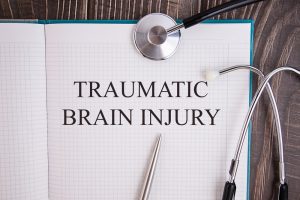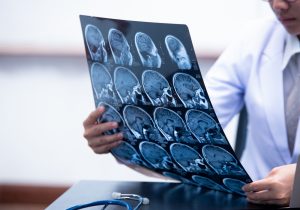Somerset County NJ Traumatic Brain Injury Attorneys
Dedicated Personal Injury Attorneys Fight for Victims of TBI in Bound Brook, Watchung, Bedminster, and neighboring towns in Somerset County

While driving the Interstate 78 through Somerset County, a truck veered into your lane, and you lost control of your car, hitting the center divider. Luckily, no one in either vehicle seemed to be hurt, even though you hit the left side of your head hard on the driver’s side window. After exchanging information with the truck driver, you started feeling drowsy and nauseous, so your friend drove you to St. Peter’s University hospital in Franklin Township. There, the ER doctor diagnosed a moderate traumatic brain injury.
What is a Traumatic Brian Injury in NJ
A traumatic brain injury (TBI) can be quite serious, even deadly. And symptoms can be debilitating after a bump or blow to the head. A severe TBI may result from an object penetrating the skull, like a bullet, or a serious whiplash, when the head violently jolts forward and back after a car accident or football tackle, for example. According to the Centers for Disease Control (CDC), the most common causes of TBIs are falls, suicide (by firearm), car crashes, and assaults. And of those that are diagnosed, New Jersey residents with TBIs number in the thousands, between 12,000 and 15,000 a year, of which 1,000 die. The New Jersey Health Department estimates about 175,000 disabled residents suffer from TBIs.
At Cohen & Riechelson, our team of attorneys has helped victims of various types of accidents and their physical consequences, including Traumatic Brain Injuries, seek and obtain fair compensation for their injuries and damages in Somerset County, NJ. We serve cities and towns like Green Book, Bedminster, Branchburg, Franklin Township, Warren, and North Plainfield.
Give us a call at (609) 528-2596 or through our online form today to analyze your TBI case and discuss your legal options. We offer free initial consultations at our office or over the phone.
What are Common Symptoms of Traumatic Brain Injuries?
The result of trauma, when the brain bounces off the skull and causes a chemical change or damage to the brain cells, is dizziness, nausea, fatigue, headaches, light sensitivity, noise sensitivity, balance difficulty, and visual disturbances. Though symptoms from a mild TBI or concussion can go unnoticed, anyone injured in a traumatic accident or assault should get checked out by a doctor. Blood clots can form in the brain, causing a loss of consciousness, migraine headaches, uneven pupil dilation, and other signs of serious injury. And though mild, a concussion can cause disturbances that result in further injury, such as confusion and disorientation while driving.
Symptoms vary, but mild concussion symptoms typically do not last as long as more moderate or severe TBIs. So, a person who hits their head on the ground on a soccer field may experience disorientation, foggy brain, light sensitivity, headache, irritability, lack of focus, or troubled sleep.
Common Complications from Traumatic Brain Injuries (TBI)
Moderate or severe TBIs are serious. Many are fatal. The primary distinction between mild and moderate to severe TBIs are the long-lasting effects. An individual suffers from a more dangerous TBI from a fall, motor vehicle accident, or assault, and the symptoms may alter their life tremendously. They suffer cognitive deficiencies, such as difficulty concentrating, understanding, learning, thinking, communicating, and remembering. Physically, they may experience trouble with balance, coordination, muscle strength, and sensory input, such as hearing, seeing, and touching, weakness, or oversensitivity. In addition, they may suffer mood swings, deep sadness, anger, or anxiety. Friends and family may not recognize their loved ones due to their personality changes.
In the worst cases, a TBI may leave someone in a coma or with amnesia. As a result, they may need an extended hospital stay and then rehabilitative care to return to their daily activities. Some may never recover, others commit suicide, and all have shorter lifespans. Commonly, they live in nursing homes or special recovery homes after hospitalization. As survivors of moderate to severe TBIs, their quality of life significantly decreases without employment, independence, and health, and they endure more frequent re-hospitalizations, as they are more susceptible to seizures, infections, and pneumonia. However, even mild TBIs affect the lives of the afflicted, regardless of age.
How is a TBI Diagnosed?
Fewer complications occur or worsen if a TBI is apparent right away. A physician who examines a patient who experienced a head injury must diagnose a TBI and is severity quickly to avoid further damage. A doctor who suspects a TBI asks a patient questions on the Glasgow Coma test to assess the patient’s ability to respond and move their body parts. CT and MRI scans detect brain injuries, fractures, and bleeding. After evaluating the severity of the TBI, a doctor may send a patient with a mild concussion home to recover but keep patients with moderate to severe TBIs in the hospital to stabilize and treat the patient with oxygen and medications to prevent seizures coma, and fluid buildup. Surgery may be an option to release fluid buildup, blood, clots, and pressure or to repair fractures.
Delayed Onset of Traumatic Brain Injury
Unfortunately, symptoms can set in right away or take hours or days to develop. More problematic, TBI symptoms are like other unrelated conditions, so many sufferers do not realize they have a TBI, or they have trouble communicating their symptoms to others. Family members and healthcare providers may miss the symptoms, and thus, a diagnosis is slow to develop, if at all.

Long Term Consequences from Traumatic Brain Injuries
Anyone is vulnerable to a TBI as people of all ages fall or ride in cars. However, some people are more at risk from dying or permanent damage from a TBI. Those in the military, veterans, the homeless, incarcerated inmates, minorities, and those living in rural areas are more vulnerable to the worst outcomes of a TBI. And children with TBIs may need ongoing care for development delays due to brain injury. A child’s brain development can affect every area of their lives, in limiting their ability to participate in school, sports, and social events. A TBI may cause personality changes, as children may have trouble behaving, thinking, and socializing. They may lack impulse control and the skills necessary to become healthy, productive adults.
And for older adults, the outcome is even more sobering. Senior adults who fall and fracture bones, such as hips or knees, or are in a car crash, may be confused and forgetful at their doctor’s appointment. Their doctor may misdiagnose Alzheimer’s or dementia if they do not check for a TBI. A missed diagnosis for an older adult taking blood thinners, like warfarin, or antiplatelet medications, like Plavix, can cause brain bleeds leading to death. Short of dying, older adults and all TBI victims may suffer complications, such as garbled speech, seizures, swallowing difficulties, hydrocephalus (fluid buildup in the brain), cerebrospinal fluid leaking, nerve injuries, tinnitus (ringing in the ears), organ failure, and polytrauma (multiple injuries throughout the body).
Contact the Somerville NJ Traumatic Brain Injury Attorneys at CR Today
Connect with an experienced personal injury firm with decades obtaining compensation for those affected by traumatic brain injuries and other injuries resulting from negligence across Somerset County and New Jersey. You can speak with a skilled attorney about your TBI case in a free consultation by contacting us at (609) 528-2596 or filling out our online form, and we will contact you shortly.
